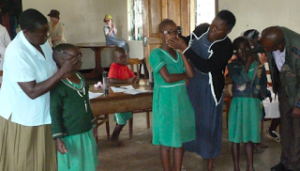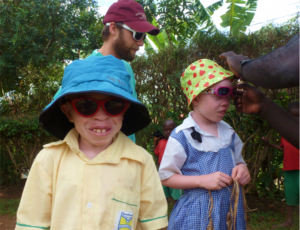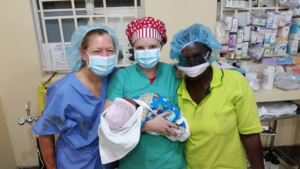 The PA Foundation awarded Carilion Medical Center a 2015 Robert K. Pedersen Global Outreach Grant for its Magale Health Project focused on improving health in rural eastern Uganda. The project represents a partnership between Global Health Educators (GHE), a 501(c)(3) nonprofit organization, and the PA program at Jefferson College of Health Sciences (JCHS) in Roanoke, Va. Since 2014, the two organizations have collaborated to assess, plan, and implement projects designed to strengthen health infrastructure capacity in eastern Uganda. Specifically, the project focuses on Magale Health Center, its sister organization St. Angela’s Orphanage, St. Angela’s School, and the surrounding communities.
The PA Foundation awarded Carilion Medical Center a 2015 Robert K. Pedersen Global Outreach Grant for its Magale Health Project focused on improving health in rural eastern Uganda. The project represents a partnership between Global Health Educators (GHE), a 501(c)(3) nonprofit organization, and the PA program at Jefferson College of Health Sciences (JCHS) in Roanoke, Va. Since 2014, the two organizations have collaborated to assess, plan, and implement projects designed to strengthen health infrastructure capacity in eastern Uganda. Specifically, the project focuses on Magale Health Center, its sister organization St. Angela’s Orphanage, St. Angela’s School, and the surrounding communities.
A project team of four PA students, one PA faculty member, and four local health professionals traveled to the rural Mbale region of eastern Uganda in October 2015. The Magale Health Center, a “level IV” health center equipped with an operating room, was selected as the project site in part because it operates as a public-private partnership between a Catholic convent, St. Angela’s, and the Ugandan Health Ministry. Local nuns supervise health center operations, medical staff, and donated equipment.
To help streamline their healthcare efforts during the trip, the team identified three prominent health issues in the community as their areas of focus: vision, albinism, and newborn and maternal health. They utilized the greater part of their grant from the PA Foundation to purchase supplies for the project, including educational supplies (laptop, projector, and printed materials) and medical supplies such as medicines, sutures, medical equipment, and items needed for surgical cases and midwife training.
 The vision pilot project was designed to train teachers at St. Angela’s School to screen students for refractive errors, which the World Health Organization estimates account for 42% of visual impairment when left uncorrected. The team noted that none of the over 750 St. Angela’s students had corrective eyewear to fix refractive errors. They devised a simple plan to diagnose refractive errors and treat them using inexpensive adjustable glasses. Team members screened 30 students and fitted six for glasses, along with one hospital employee. In an effort to promote long-term sustainability of the pilot program, PAs and PA students taught local teachers and medical workers how to perform vision exams and adjust the glasses. St. Angela’s faculty also formed a Vision Impairment Committee to evaluate project success and report back to the project team regarding durability of the glasses and students’ commitment to wearing them.
The vision pilot project was designed to train teachers at St. Angela’s School to screen students for refractive errors, which the World Health Organization estimates account for 42% of visual impairment when left uncorrected. The team noted that none of the over 750 St. Angela’s students had corrective eyewear to fix refractive errors. They devised a simple plan to diagnose refractive errors and treat them using inexpensive adjustable glasses. Team members screened 30 students and fitted six for glasses, along with one hospital employee. In an effort to promote long-term sustainability of the pilot program, PAs and PA students taught local teachers and medical workers how to perform vision exams and adjust the glasses. St. Angela’s faculty also formed a Vision Impairment Committee to evaluate project success and report back to the project team regarding durability of the glasses and students’ commitment to wearing them.
The project team identified albinism as another focus area in light of the 30-plus children and adults with albinism living in the Magale community. In many African countries, prevailing superstitions incite discrimination against people with albinism and subject them to death, dismemberment, and abandonment at birth. They also face health conditions such as skin cancer and  early blindness due to harsh external environments and lack of access to healthcare. A PA student on the project team led an albinism education initiative designed to dispel myths and educate local teachers, midwives, health center staff, and nuns about the health needs of people with albinism. The project team supplied educational materials to local community leaders to enable them to continue giving informational presentations after the team’s departure. Health center staff and community leaders went on to organize four albinism programs for outlying communities and delivered hats, sunglasses, and magnifiers to over 40 adults and children with albinism. To further boost sustainability, they left teaching materials at the community centers for local residents to disseminate themselves.
early blindness due to harsh external environments and lack of access to healthcare. A PA student on the project team led an albinism education initiative designed to dispel myths and educate local teachers, midwives, health center staff, and nuns about the health needs of people with albinism. The project team supplied educational materials to local community leaders to enable them to continue giving informational presentations after the team’s departure. Health center staff and community leaders went on to organize four albinism programs for outlying communities and delivered hats, sunglasses, and magnifiers to over 40 adults and children with albinism. To further boost sustainability, they left teaching materials at the community centers for local residents to disseminate themselves.
Maternal and newborn health comprised the third major project focus. Postpartum bleeding and eclampsia are the leading causes of death for pregnant women in Uganda, prompting the project team to develop a maternal health training program for health center staff. Eight midwives attended the program, which included scenario-based discussions and reviews of appropriate treatment options. Team members also mounted a management algorithm chart and permanent blood pressure monitors in the labor and delivery room. Newborn health efforts, meanwhile, focused on educating health workers about  the importance of newborn thermoregulation to decrease risk of hypothermia and hyperthermia and reduce infant mortality. Two PA students developed a training module that included low-cost temperature monitoring strips and a reference chart for staff and families to monitor infant temperatures. Finally, the project team provided support for the Traditional Birth Referral Agent (TBRA) program, a community-based program established in 2014 by Ugandan traditional birth attendants and midwives with the goal of improving maternal and newborn health. The team supplied local program leaders with training materials and other supplies, including program t-shirts and certificates.
the importance of newborn thermoregulation to decrease risk of hypothermia and hyperthermia and reduce infant mortality. Two PA students developed a training module that included low-cost temperature monitoring strips and a reference chart for staff and families to monitor infant temperatures. Finally, the project team provided support for the Traditional Birth Referral Agent (TBRA) program, a community-based program established in 2014 by Ugandan traditional birth attendants and midwives with the goal of improving maternal and newborn health. The team supplied local program leaders with training materials and other supplies, including program t-shirts and certificates.
Despite their many successes during the October 2015 trip, the Magale Health Project team isn’t done yet. They plan to apply their remaining grant funding towards another trip to Uganda scheduled for October 2016, during which they will evaluate and expand upon the programs initiated the year before by collecting data, refining training materials, and replenishing supplies. The team has also purchased an ultrasound machine and plans to implement a low-tech ultrasound training program for local midwives.
The PA Foundation is proud to support this PA-led project that is making a sustainable contribution to healthcare and patient health outcomes in an underserved community.

